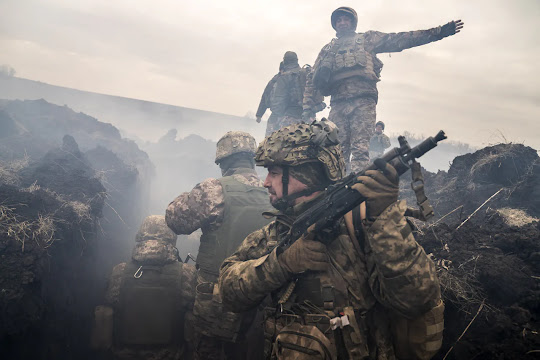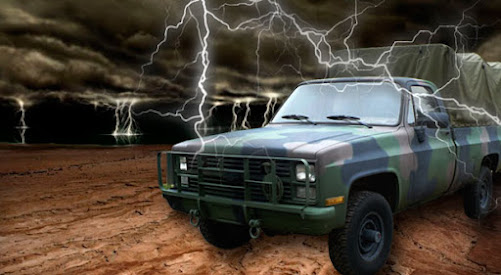Experts Predict The End! Is There A Real Possibility Of World War III Starting In 2024? (The Power Struggles Hold The Potential to Spark A Wider Conflict.)
With the rapid changes happening around the world, it's natural for people to ponder the possibility of another world war. The idea of a global conflict stirring fear and uncertainty is a topic that demands serious consideration. While it is crucial to approach such discussions with professionalism and a balanced perspective, we cannot turn a blind eye to the potential risks and tensions that may contribute to an eruption of heightened global conflict. Here I will explore the various factors that could influence the possibility of World War III starting in 2024.
Understanding the Global Political Landscape
When discussing the likelihood of a world war, it's essential to examine the current geopolitical climate. The balance of power between nations, continuing international conflicts, and the presence of alliances play a significant role in shaping the global political landscape.
In recent years, we have witnessed growing tensions between major powers such as the United States, China, and Russia. Rivalries in economic, technological, and military domains have escalated, with each country vying for dominance. These power struggles, if not carefully managed, hold the potential to spark a wider conflict.
The Impact of Regional Conflicts
Regional conflicts have always been a precursor to larger global conflicts. The Middle East, for instance, has been engulfed in ongoing conflicts and tensions between various nations for decades. With multiple stakeholders involved and an increase in proxy wars, the region remains highly volatile.
Additionally, trade disputes, territorial conflicts, and ideological differences between nations further contribute to the possibility of larger-scale conflicts. The unresolved issues in the Korean Peninsula, for example, present a constant threat to regional stability and have the potential to escalate into a more extensive conflict involving major powers.
Technological Advancements and Warfare
The rapid advancements in technology have not only revolutionized various aspects of our lives but have also significantly impacted warfare. As nations continue to invest heavily in military research and development, new and powerful weapons emerge.
One area of concern is the development of cyber warfare capabilities. With nations increasingly relying on interconnected networks, the vulnerability of critical infrastructure to cyber-attacks grows. The potential for cyber warfare to escalate into a full-blown conflict cannot be ignored.
Furthermore, the development and proliferation of advanced weaponry, such as hypersonic missiles, unmanned drones, and artificial intelligence, pose additional challenges. These technologies enhance a nation's military capabilities, but they also create potential risks if they fall into the wrong hands or if misunderstandings arise.
Climate Change and Resource Scarcity
Climate change and the scarcity of vital resources such as water and energy are issues that have the potential to exacerbate tensions between nations. As climate change continues to disrupt ecosystems and affect weather patterns, conflicts over resources may become more frequent.
Competition for scarce resources could lead to increased rivalries and conflicts, which, if left unaddressed, might escalate into a global conflict. Additionally, the impacts of climate change, such as sea-level rise and food insecurity, can create population displacement and political instability, further fueling the potential for conflict.
The Importance of Diplomacy and International Cooperation
While the aforementioned factors highlight potential dangers, it is crucial to remember that diplomatic solutions and international cooperation can help prevent conflicts from escalating. Engaging in dialogue, fostering understanding, and resolving disputes peacefully are essential steps towards maintaining stability on a global scale.
In today's interconnected world, the need for collaboration and diplomacy is more important than ever. Multilateral organizations and diplomatic channels provide platforms for nations to address their differences and work towards mutually beneficial solutions.
The Responsibility of Nations
All nations play a role in shaping the global landscape and mitigating the risks of a world war. It is the responsibility of each nation to prioritize peace and stability, to strengthen diplomatic ties, and to work towards resolving conflicts through peaceful means.
At the same time, it is vital for citizens to be informed and engaged in the political processes of their respective countries. By holding their leaders accountable and advocating for peaceful solutions, individuals can contribute to a more stable and secure world.
Finally, While it is impossible to predict the future with certainty, it is essential to acknowledge the factors that could potentially lead to a world war. The global political landscape, regional conflicts, technological advancements, climate change, and resource scarcity all present risks that cannot be ignored.
However, it is crucial to approach this topic with a balanced perspective and not succumb to fear and panic. Diplomacy, international cooperation, and responsible leadership are key in preventing conflicts from escalating into a global catastrophe.
It is only through understanding, collaboration, and a shared commitment to peace that we can work towards a world free from the devastation of war. Let us strive for a future where conflicts are resolved through dialogue and where peace prevails.




Comments
Post a Comment